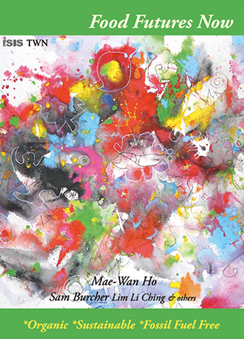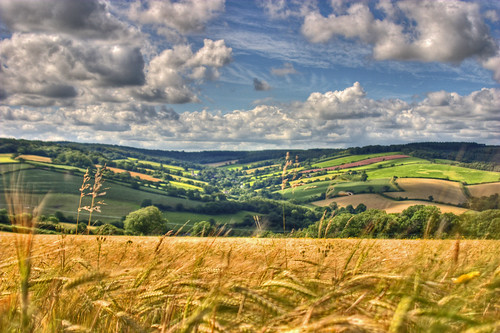
How organic agriculture and localised food (and energy) systems can potentially compensate for all greenhouse gas emissions due to human activities and free us from fossil fuels
“Most compelling! A succinct and pithy appraisal of the current state of the planet - and just the right resolutions.”
Sir Julian Rose , a leading exponent of organic farming, Chair of the Association of Rural Businesses
“This excellent and timely report makes clear how vital it is that we make the right choices on how to produce and distribute our food in tackling climate change, and what those choices should be.”
Dr. Caroline Lucas , Member of the European Parliament
Highlights
- The largest single study in the world in Ethiopia shows composting gives 30 percent more crop yields than chemical fertilizers
- Scientists, too, find organic out yields conventional agriculture by a factor of 1.3, and green manure alone could provide all nitrogen needs
- Local farmers in Sahel defied the dire predictions of scientists and policy-makers by greening the desert and creating a haven of trees
- Organic urban agriculture feeds Cuba without fossil fuels
- Organic agriculture and localised food systems mitigate 30 percent of the world's greenhouse gas emissions and save one-sixth of energy consumption
- Anaerobic digestion of farm and food wastes in zero-emission food and energy farms could boost total energy savings to 49.7 percent and greenhouse gas savings to 54 percent
- Cleaner, safer environment, greater biodiversity, more nutritious healthier foods
- Higher income and independence for farmers, more employment opportunities
- Regenerate local economies, revitalize local, indigenous knowledge, create social wealth.

Preface
Warming of the climate system is unequivocal, and it is accelerating, says the latest Intergovernmental Panel on Climate Change (IPCC) Report, released 17 November 2007. Eleven of the past twelve years are among the warmest since records began. Sea levels are rising faster than predicted. Heavy rains, droughts and heat waves are more frequent, and happening over larger areas of the globe. Cyclone Sidr hit Bangladesh two days earlier leaving a death toll of more than 10 000 and rising, a dramatic enactment of the “increase in intense tropical cyclone activity.”
It will be much worse as the century progresses, IPCC predicts, and has “very high confidence” that human activities are to blame, most of all, in burning fossil fuels. The annual growth rate of CO2 in the atmosphere has jumped from an average of 1.4 ppm a year since 1960 to 1.9 ppm over the past ten years.
The good news is we can do a lot to mitigate global warming by reducing greenhouse gas emissions. IPCC tells us that keeping CO2 levels down to the most stringent levels will cost less than 0.16 percent of Global GDP a year up to 2030. Surprisingly, however, IPPC has failed to mention organic agriculture or sustainable food systems in mitigating climate change.
That is why Food Futures Now is so timely. It documents how organic, sustainable agriculture and localised food (and energy) systems can potentially compensate for all greenhouse gas emissions due to human activity and free us entirely from fossil fuels. It is a unique combination of the latest scientific analyses, case studies on farmer-led research, and especially farmers' own experiences and innovations that often confound academic scientists wedded to outmoded and obsolete theories. There is a welcome mix of practical know-how and new theoretical concepts to put things in the broadest perspective.
This volume is the second report of ISIS' “Sustainable World Initiative”, launched April 2005, to “make our food system sustainable, ameliorate climate change and guarantee food security for all.” We produced the first report, Which Energy? [1] in 2006, when it became clear that sustainable energy use is also a key issue, as fossil energies are depleting and demand for unsustainable “biofuels” is threatening food security and accelerating climate change. In that report, we made 18 recommendations for a mixture of renewable energy options at the medium, small, and micro-generation levels, including biogas from anaerobic digestion of biological wastes, solar and wind power. We ruled out nuclear energy, any energy-intensive extraction of fossil fuels or carbon capture and storage process that extends our dependence on fossil fuels, and energy crops for biofuels (unless they are shown to be truly sustainable).
We also recommended organic, low input sustainable farming for mitigating climate change, especially integrated food and energy production, with emphasis on the use of local resources, and consumption at the point of production.
The present volume is an extended, in-depth argument for this option, also touching on the transformation of the dominant knowledge system it entails.
I hope everyone will read it, policy-makers and citizens alike, scientists, farmers and the general public. Food Futures Now is a manual for social revolution to a post-fossil fuel economy that will restore the good life to all.
Mae-Wan Ho
February 2008
READ MORE: http://www.i-sis.org.uk/foodFutures.php


0 Comentarios:
Publicar un comentario
Suscribirse a Comentarios de la entrada [Atom]
<< Página Principal